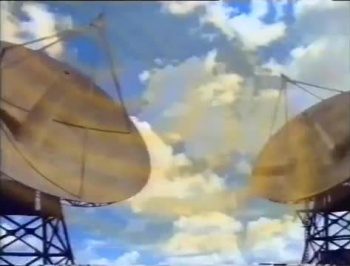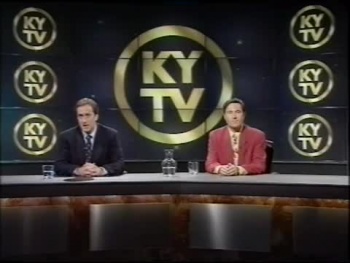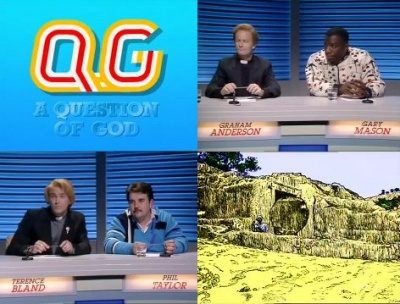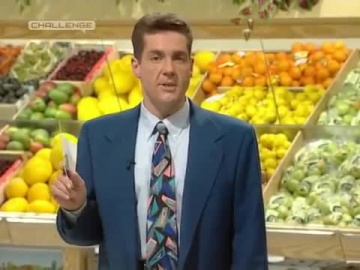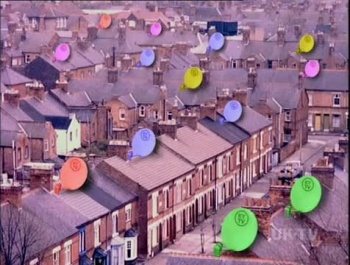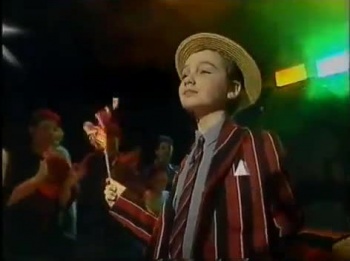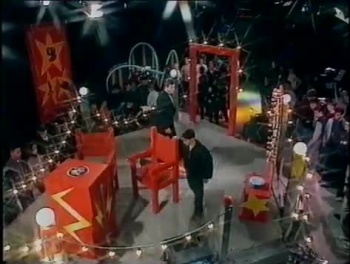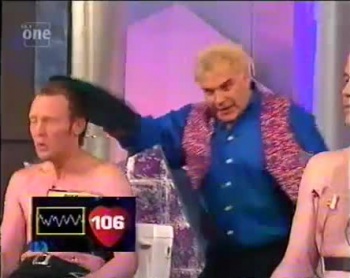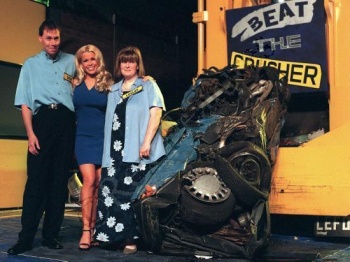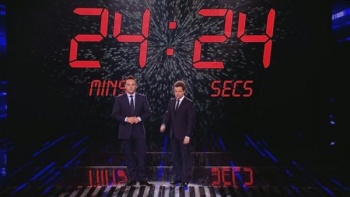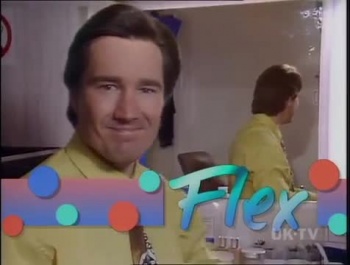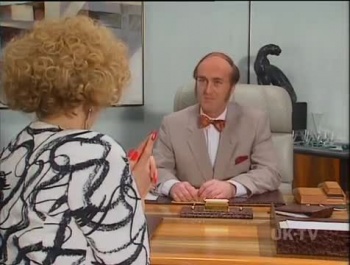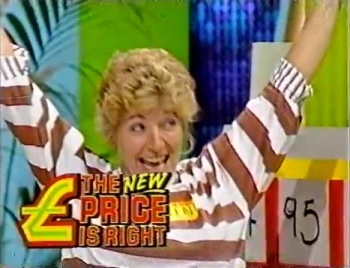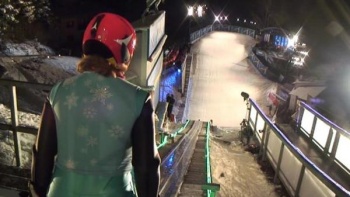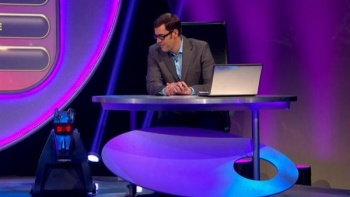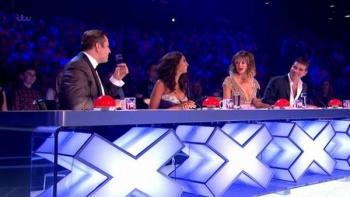Weaver's Week 2014-02-09
Last Week | Weaver's Week Index | Next Week
"It's still somehow not anywhere near mediocre."
Contents |
23¾ Years of KYTV Part 2
- What you're about to read is a spoof. A satire. There are elements of truth, there are elements of fiction, and we don't much care for the dividing line.
Last week, we looked at the launch of satellite television in the UK, with two operators making ambitious claims about their programming, and at least one of them providing shows that couldn't live up to it. One of them could: the Galaxy channel's soap opera Moons of Jupiter had sent a cast and crew up to live on a space station. The shots of Jupiter were generated by chromakey: after all, BSE wasn't made of money.
We left the story in November 1990, with a paper on the prime minister's desk. It sought an equal merger of BSETV and KYTV, otherwise one or both might be out of business by the end of the month. As we know, she approved this deal.
Truly, it was a merger of equals. Each company brought something to the table. KYTV had the programmes, the administration offices in Isleworth, and the first half of the merged company's name. BSETV had the advertising contracts, some juicy real estate in central London that could be rented out for a song, the interview skills of Robin Day, and the second half of the merged company's name.
The prime minister gained, resigning her office within a month in order to spend more time as a very obvious quiz answer. Viewers gained: by early 1991, they had two subscription movie channels, and a British sports channel. Viewers also lost; though the new company agreed to be regulated by the British body the ITC, it didn't have quite such strong public service requirements.
There were some residual requirements, it had to air party election broadcasts, and make programmes for the religiously minded. That explains the rightly reverend "A Question of God", in which celebrities of the day (such as world darts champion Phil Taylor) appear with religious leaders to discuss theological quandaries, and answer the question "What happened next?" These PSB requirements were lifted in 1993.
It's generally forgotten that KYTV wasn't the only English-language television operator on the Astral satellite. Four other channels were available in 1989, but only one survives today. That's Rok TV, which originally played music videos to the whole continent and gave news about Europop acts such as Dr. Albran. These days, it's been fragmented into a dozen different versions across Europe, none of which actually show any music video. The Children's Channel aired programmes for the young, with a strand of stories without words proving very popular. (We were going to discuss the career of presenter "Uncle" Mike Stand, but after the latest developments in Operation Yout00b, our legal advisers suggest we don't.) The Children's Channel turned into the Trouble channel in 1997, initially targeting UK teen viewers, and latterly young black people; it closed in 2009.
If KYTV Sports was the first choice for the British sports fan, and Europa Sports had been part of the KYTV package until something better came along, Screensport was the third choice. It got by on a diet of B-list speedway, C-list lacrosse, and from-the-D snooker trick shot championships. The channel closed in March 1993, and merged with Europa Sports. At the same time, Lifestyle closed. This was a channel for women, airing magazine shows like Sally Jessy Raphael, made-for-TV movies, and novellas such as Ole! [Fancy That!]. Lifestyle did a good line in soap operas and Australian programmes, but also had a block of recent American game shows, including Classic Concentration, The Joker's Wild and some programme called Supermarket Sweep. By summer 1993, these shows turned up on KYTV, as the company continued to reduce its British entertainment productions to the bare minimum.
KYTV had lived by the maxim that if you fling enough excreta at the wall, some of it will stick. Having cancelled the expensive production contracts inherited from BSETV, and ended many of its own shows, the channel relied on programmes brought across from North America. These shows were cheap, and required no dubbing as they were made in a language sufficiently similar to English. Many of these imported programmes were obvious schedule filler, but – almost inevitably – one or two would catch the popular imagination.
An infinite number of monkeys at an infinite number of typewriters will, given enough time, produce a script worth making. That good luck fell to The Simpsons, a fly-on-the-wall documentary about Springfield, a small town in Missouri. The channel's one hit programme was, unsurprisingly, promoted everywhere – in KYTV's "buy our dish" publicity, in the pop charts, latterly in films. The Simpsons was produced by KYTV's sister company, and this corporate match made it possible to keep the programme exclusive to satellite until 1996, when the show was finally sold to BBC1.
Most of KYTV's effort went on its sports coverage. Alun Salty and his Amstad company had played a crucial role in KYTV's success, making many of the inconspicuous dishes that the eagle-eyed might spot. He played a further trick in KYTV's favour, tipping them off about ITV's bid in the auction of rights for the newly-formed Premier League. KYTV Sports revolutionised the game, introducing cheerleaders, and hyping up every single match, even the most meaningless midtable bore.
We were to think that Monday's game was the most important event since the creation of the world, and KYTV promoted the sport at every opportunity. But only to those who could and would pay for the privilege; after three games in August 1992, the service was encrypted. There wouldn't be a free-to-air top flight game until August 2013. Opinion is divided on how good KYTV has been for fans of tiddlywinks.
"Whenever you want it, it's there" had been the catchphrase of BSETV. But only if you wanted to watch television in poor quality, the technical advantages of its D2MAC transmission had been removed with the merger, and at end of 1992 the picture disappeared forever. KYTV sold the satellites to a Nordic broadcaster, and let Marcopolo House to its Sofa Shop subsidiary ("You spend, we send"). Sofa Shop was itself sold off in early 1993, changing its name to PVC (the car-boot shopping channel).
Games World
Hewland International for KYTV, 1993-5
As we noted earlier, KYTV had almost eliminated its UK entertainment production. Its only show of note in the mid-1990s was a television game about games on television. Specifically, a challenge to demonstrate proficiency in computer games. Gamesworld was hosted by Bob Mills, and went out every weekday in a slot adjacent to The Simpsons. The programme included tips on how to win video games, reviews of the latest attractions, and eventually interactive games played live by the magic of touchtone phone technology. The bulk of these features appeared on Channel 4's Gamesmaster (also a Hewland International production), and sensible scheduling ensured that the two shows didn't clash.
Gamesworld had the advantage of being on every night of the week. That allowed for a structure to the week, with games players competing amongst themselves, and against professional characters, for the right to compete in the weekly final. These characters were characters who could have stepped out of a video game or a comic book. "The Executioner" owed something to classic television wrestling, while "The Games Messiah" had been a regular on KYTV's final religious show God Alone Knows.
Another character, "Master Moriarty", was played by Lekkie Yellowhammer, the boss's son. There were claims around this time that KYTV was a jobs-for-the-boys station, but this was a load of nonsense. Once it had turned Top Chef and MI Nine into sizeable hits, KYTV would buy out Sheen Productions. It had been owned and run by Lizzy Yellowhammer, the boss's daughter.
But that lay in the future. Here, Bob Mills and his guest commentator explain the game we're about to see, give a few tips about how one can win (or lose) in it, and then we're into the challenge. Probably about half the programme time is taken up by watching people play video games; by varying the challenges (some fighting with Mortal Kombat, some target running with Sonic and Tails, a Mario cartie race) the show always offers something different just around the corner. Mills is a fine presenter, and Gamesworld is an entertaining watch, but it's all played very straight. It's not got the mad glint we glimpsed in the monocle of Gamesmaster.
KYTV wasn't the only channel on the satellite, of course. By 1993, there were 48 channels available to viewers, about half of them broadcasting in English. The archive programmes that had bulked out Galaxy's schedule went on UK Old, where they were joined by the best from Thames Television's vaults. KYTV started to charge for its general entertainment channels, £4 per month would buy such highlights as Nickelodeon, TLC, and KY Travel Vision. Also included in the package was The Family Channel, owned by a religious group, suitable for all ages, and featuring many programmes from the TVS archive. This included a 90-minute block of game shows; by 1997, the games had expanded to fill the entire evening, and the channel was renamed as Challenge. It was eventually bought up by KYTV, and thrown out as cheap filler on Freeview.
Other channels came and went: KYTV Soap lasted a few years, as did the Country Music Channel. Discovery and UK Living turned into long-running successes, but McKYTV (for Scottish viewers) ran for about three weeks, and The Warner Brothers Channel managed to go off air before it had even launched. KYTV was embroiled in some sort of dispute with WB over cable carriage in New York – we forget the exact details, but do remember that expensive billboard adverts were all anyone ever saw of the WB Channel.
Satellites only have a finite lifespan, and by 1998 the original Astral satellites were beginning to show their age. KYTV launched new satellites, and promised a move to digital television. This required all of their customers to buy new equipment, and move their dish by an angle of about 9 degrees. The dream of pan-European television died about this time, the new satellite was reserved for the UK and Ireland only. New customers were sold a new digital-only satellite dish, the smallest ever made; it's still larger than the BSB squarial.
Digital television used a completely new transmission technique: rather than delivering the picture as over 500 lines 25 times per second, it delivered three or four complete frames each second, and then tracked the changes from one frame to the next. It allowed many more transmissions to be squeezed out of the same space, typically eight-to-ten digital video channels for each analogue channel.
According to the adverts, this new-fangled digital television would bring about a revolution in choice and quality. Was this deliberately echoing the claims made a decade earlier? We doubt it, no-one would remember a hollow claim from ten years ago. The new digital era brought us landmark programmes, like
Beat the Crusher
Tiger Aspect for KYTV, 1998
The star of this show wasn't Freddie Starr. Goodness, the star of absolutely no show on television is Freddie Starr. Nor was it Melinda Messenger, even though she managed to appear on this programme and on Channel 5's Fort Boyard at the very same time.
No, the star of Beat the Crusher was a crushing machine. Feed something in at the top, and it gets compressed and spat out as bits. This was, of course, a tremendously clever analogy for this new-fangled digital television: it demonstrated how one could take something large and unwieldy, and with the application of new technology turn it into something much smaller. With the appropriate tools that compressed item can then be reconstructed with only a slight reduction in appearance.
The programme's remembered for an oh-so-hilarious finale, in which two couples staked their own car for the chance to win a brand new car. The winners of this best-of-seven quiz got the brand new car, the losers had their car put into the crusher. It was still perfectly driveable, all the bits were there, they might just have to spend a bit of time putting them into the right order.
What's less well remembered is how this was just the last part of a lot of parts. Beat the Crusher was driven out of town each week, chased out by the locals waving pitchforks and shouting "Never darken our walls again!" The show travelled around the country, always coming to rest in a C-list shopping centre desperate for an hour on television even if it was only on satellite telly.
A recurring feature was "The Coolest Man In Knowsley" (or wherever it was), during which some strapping young men would remove their shirts, have heart monitors attached, and be given minor frights. Putting ice down their trousers, banging a door behind them, have yesterday's gravy from the shopping centre food court poured over them. And there's a team talent competition.
About half the programme was given over to a talented baby contest, the judging of which was entirely arbitrary and whimsical. Seeing as how it filled up half the programme, and was a recurring theme throughout the show, we can reasonably describe Beat the Crusher as a bonnie baby contest with some particularly mean sideshows. Beat the Crusher made a big deal out of a very small part of the programme – it's as if House Party had called itself "Grab a Grand", or Saturday Night Takeaway had billed itself as "The Win The Ads Show".
There were suspicions that this programme was just ripping off Noel's House Party, but they were soon dispelled. Even though House Party was clearly past its prime – it would limp to an end the following spring – Noel's pranks and japes always had a hint of good humour. Beat the Crusher was a House Party rip-off that forgot to be funny or entertaining. It was heavy-handed, mean-spirited, and thoroughly depressing viewing. It demanded its viewers laugh at these poor unfortunates with the blatant threat that "next time, it could be you".
The last word goes to Operation Yout00b, a video-sharing site that holds almost all the televisual dreck ever made. Most programmes of the 1990s are available there, as a sample episode or more. Such is the excellence of Beat the Crusher than only half of an episode exists; the second half has fallen beneath the Yout00b quality threshold. Apparently, that's a thing.
And so the story goes on. KYTV saw off the threat of subscription digital terrestrial television in the UK. Digital On had launched with a carefully-selected bouquet of twelve channels, carried exclusive programmes like the last ever series of Gladiators, and had the backing of ITV. Digital On also had a smart card that was easy to forge, and it soon became clear that card forgery was a major problem. There were suggestions and allegations that the forgers were under the pay of companies indirectly linked to Yellowhammer, but nothing has ever been proven in court. Digital On was replaced by the non-subscription Freeview, to which KYTV contributed channels promoting its own subscription products.
KYTV also changed its programme policy in the late 90s, aggressively buying up rights to imported shows that other channels had made into hits. The phenomenon started with Friends and ER, made successful by Channel 4. KYTV had the rights to Muffy the Werewolf Slayer, but left the shows on the shelf until the BBC demonstrated that it was actually a hit programme. Latterly, KYTV has bought all the rights to series other channels have built. They've snatched 17 off BBC2 after two series, Lost and The Sopranos from Channel 4, Mad Men from BBC4, and the school singing show Glee from E4. All of these shows were instantly relegated from cultural phenomena to obscurities that no-one in the real world actually sees. The most-seen Jack Bauer in the last decade was Big Brother's Andrew Edmonds.
When it does make its own programmes, KYTV treats them as the most important thing anywhere on television. Britain's Got Singers was billed as a groundbreaking programme, it turned out to be a poor clone of The X Factor. So You've Got To Dance was the art-free spoiler to the BBC's quality modern dance contest, but was promoted as the greatest programme ever made since the heyday of Donna Summer.
Remarkably, Beat the Crusher didn't mark KYTV's nadir. That dubious honour falls to There's Something About Miriam (2003), a show designed from the start to laugh at transgender people, and to stigmatise them as something entirely alien. Worse, the show repeated a canard that trans people are out to deceive the rest of society. The show was tawdry, it was repulsive, and even ten years later it was being held up to ridicule by television panels.
The revolution wasn't just going to bring us a change in quality, it would bring us a change in how we perceived time. The brave new world of digital television allowed broadcasters to stretch their programmes further. Missed a show at 8pm? No matter, it goes out again at 9pm on the One Hour Later channel. As if that wasn't enough, they launched KYTV Minus in 2006, allowing people to record shows and watch them before they're transmitted.
KYTV was hit by the sudden, tragic, and untimely death of Mike Flex in 2008. The much-loved daytime host was the subject of a tribute series, The Best of Flex. Following concerns that this might not accurately describe the content, the second episode went out as Classic Flex, before changing at the first ad break to Flex Gold. It then spent five minutes as Flex Old before concluding under the title Another Mike Flex Compilation Using The First Tapes That Came To Hand.
Behind the scenes, Sir Kenneth Yellowhammer – he was knighted in 1998 for services to party coffers – tried to take KYTV back into private ownership, reversing an earlier stock market flotation. This foundered when it was alleged that his staff were bugging telephones and intercepting internet communications. No I never did anything like that – KY. The government and politicians were outraged, not just at the fact that someone was carrying out espionage on the population, but because some privateer was being far more successful than their retained organisations. The National Spying Agency and the General Cloak 'n' Dagger Headquarters were peeved that they'd been bettered by Yellowhammer and his minions. This is tosh; they're a fine, upstanding bunch of law-abiding citizens, and all spying is proportionate to the threats against us as a company. Country. – KY.
So what. Of KYTV today? There are now over 500 channels available through satellite television, and thanks to the magic of timeshift channels, repeats channels, and timesharing HD channels, there are almost a hundred different streams of shows. The new high-definition pictures are an improvement on the previous digital pictures, and some of the better HD streams are about as sharp as the D2MAC pictures offered by BSB in 1990.
KYTV has provided a revolution in choice: there's vastly more opportunity to watch television today than there was in 1988. KYTV has also ushered in a revolution in quality: where there used to be six programmes of quality and distinction on four channels almost every night of the week, there are now six programmes of quality and distinction somewhere on a hundred channels.
The big television blockbuster lives on; the likes of Downton Abbey and Strictly Come Dancing are appointment-to-view television for many millions of people, precisely because they're high quality shows. For the vast bulk of the week, KYTV's extensive programme guide is filled with ancient repeats, undistinguished imports, and lacklustre filler. Such as KYTV Living's programme Mostly Ghostly, in which Yvette Fielden tries to communicate with the undead, and we hear exclusive revelations from the afterlife courtesy of co-host Mike Flex.
KYTV's problem is summarised by a soundbite from the founder's son Jimmy Yellowhammer: "the best guarantor of quality is profit". So the fact that KYTV is making a profit implies and guarantees that it's making quality programmes. Except that it's not making quality programmes, it's making shows that are both OK and cheap. And that's what this column doesn't get about KYTV, we understand the company's philosophical position enough to know we completely disagree with it.
KYTV has had one further requirement of its viewers: patience. The Mouse Channel launched six years late. KYTV Arts and the WB have both kept viewers hanging for a mere 17 years. We were hoping to finish this piece with a review of Duck Quacks Don't Echo, but the "31 January" launch date turned into "7 February", too late for consideration here. We were also hoping to review Timeline, but the "early 2014" start date has already slipped into "spring 2014". Not that this has stopped the hyperbolic promotion on the Challenge channel, proclaiming this to be the greatest quiz since forever. KYTV still hasn't learned that the most important thing is to have a good programme; too often, the channel promises the moon and stars but only delivers a small piece of sky.
Lateness isn't a problem for next week's review of The Jump, because the series has already started and finished.
University Challenge
Group Phase 1, Match D: Queen's Belfast v Southampton
On the way here, Aberdeen and Downing Cambridge have fallen to the Queen's side; Loughborough and Bangor succumbed to Southampton. Queen's got the first starter, but Southampton picked up the next five; at the picture round, Southampton led 95-25, with 19/20 questions answered correctly by the sides. Southampton also impressed us with knowledge of the Emu Wars, in which a blue glove puppet and its acolytes did battle with the massed forces of Parkinson, before diving headlong into a freezer.
Even the guesses count: Matt Loxham of Southampton buzzes in towards the start of a question, makes a wild guess on what he's heard so far, and is as surprised as anyone to find he's correct. By the music round – fanfares – Southampton has opened up a lead of 165-25, and it's clear there's only going to be one winner. This is made even more clear when the Queen's side fails to recognise the composer of the Eurovision anthem, though they do manage to achieve perfection on a set about perfect numbers. At the second visual round, portraits of 19th century Russian authors, Southampton have stretched the lead to 210-60.
And so it continues: Queen's pick up a little more, Southampton has a lot more, and the final score is 290-90. It's clear that Southampton know a lot, and their opening-round defeat to SOAS was a rare case of two powerhouses meeting in the opening round. We don't think those two can meet again before the grand final.
This Week and Next
The newshounds at Bother's Bar have spotted quite a lot of new programmes. On ITV, we hear about The 21st Question. Ten contestants are whittled down to one over twenty questions, with the winner answering the final question. Gethin Jones from Holding Out for a Hero is down to host, and Chocolate Media to make. This is an hour-long daytime show, and we fear more chatter than Who Dares Wins-style shootouts.
Elsewhere on ITV daytime, Ejector Seat will be hosted by Andi Peters. The big gimmick here is that one wrong answer will see a contender deposited out of their seat and replaced by the next person in line. The great Connections revival continues, this time called The Link and filmed in Glasgow. Is Eugene ready?
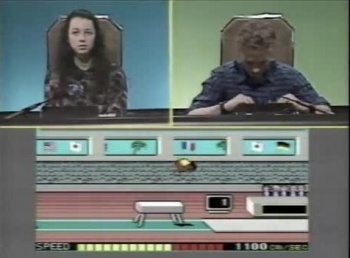 Oh, that was First Class The Video Quiz.
Oh, that was First Class The Video Quiz.
Rob Brydon, the last decent host of I'm Sorry I Haven't a Clue, is to host The Guess List on Saturday night BBC1. It's a version of Family Fortunes with prizes borrowed from Win A Wok. Over on BBC3, a pilot called Junk where the audience bring in their tat and comedians think of a reason why they should have it. Joe Lycett's hosting. And news from The Grate Fifteen-to-One revival; such is the reduced budget that contestants will have three chances to reach the daily final, thus cutting the numbers from 285 to a little over 100. Nineteen heat winners will come back for a final, and then we can conclude if the format was right for renewal.
Democracy season continued, with Broadcast Magazine's awards bash. This event was promoted like billy-o on Broadcast's twitstream. They ceaselessly repeated every single "ooh, hope we do well" message they could come across, from people we wouldn't know from Eve, and shows we'd never heard of and couldn't get. The magazine was excited, this column wanted to hit the "mute" button.
The actual winner list is a wonderful guide to what the media bubble thinks is great television. Gogglebox and Broadchurch won everything they were up for, as is the fashion. ITV won Channel of the Year, following the Edinburgh Festival lead. Of game shows, Saturday Night Takeaway was named Best Entertainment Programme, and Pointless somehow failed to win Best Daytime Programme, falling to The Sherriffs Are Coming. Apparently, that's a thing. We never knew.
Eurovision season approaches, but the EBU is still clearing up the mess from last year, when a jury's result was discarded from the semifinals. There were reports that representatives of ÍTV in Azerbaijan had tried to bribe voters with cheap mobile phones and replacement identifiers. While the EBU confirmed that something had happened, and been spotted by the existing procedures, it could not link the plot to any of the competing broadcasters. Nevertheless, the EBU has promised to remove any broadcaster found cheating, for up to three years.
RTÉ has named the five acts that might fly the flag in Denmark. Amongst them is Eoghan Quigg, alumnus of The X Factor and last seen promoting his single on Blue Peter. He was upstaged by Joel Defries. The Irish public will make an informed choice about their representative at the end of the month. This side of the channel, we're still waiting to hear who the BBC will inflict on us. Will it be Paul Weller? Barney Harwood? Fish from Marillion? An actual fish? Geri Halliwell? The suspense is literally without beginning.
Which brings us to Simon Cowell's Trousers. They're coming back to The X Factor this autumn, closely accompanied by the rest of Simon Cowell's clothes. Since Mr. Cowell left in 2010, to concentrate on making XFac stateside, his UK programme has gone from One Direction to Luke Unfriended. The Yankee version has gone from "on screen" to "cancelled", having been as good at breaking talent as BBC The Voice of UK.
Mastermind moved ever closer to the second phase, with heat 22 of 24.
- Kate Morris (Musicals of Lerner and Loewe) seemed to expect more questions about the content of the musicals than their background, fell into a pass spiral, and finished on 4 (7). As we say from time to time, we'll listen to no criticism from anyone who hasn't taken part in the show, and anyone who has occupied the chair will know how it melts nerves of steel. The contender gets her revenge by knowing Miss Marple's given name, and storms away to an entirely creditable 16 (13).
- Jon Wilkins (Novels of Cara Black) started with a lot of passes while answering questions about the novels set in Paris. The author is not to be confused with the Zimbabwean tennis player. 5 (7) is slowly enhanced, and though he picks up speed towards the end, it's not quite enough for the lead – 13 (12).
- Becky Shaw Simms (Snooker World Championships 1977 – present) covered the period when the tournament has been at the Crucible in Sheffield. There are a lot of questions about individual players and obscure matches, and the contender gave most of the right answers, though not necessarily in the right order. 6 (2) is a good score from a deceptively hard subject. In her general knowledge round, the contender continues to answer quickly on questions she thinks she knows, and swiftly passes on the others. It crams in the questions, but the points don't really tick over at a rate. The final score is 14 (9).
- Rae Donaldson (Philip II of Spain) gave his name to the Philippines, and sent over the Spanish Armada, a demonstration of the invincibility of the only sea power of the Atlantic. This round went somewhat better, no beards were singed (not even Mr. Paxman's), and 13 (1) the final. In a low-scoring week, the contender needs four to win, and the host intimates that this is just a formality. We never know, the contender might take a leaf out of David Aaronovitch's book and answer "Trotsky" to every answer. He doesn't, but there are a few passes before he reaches the finishing line, and the contender doesn't make any effort to run up the score.
A win is a win, 27 (4) is more than enough to bring Rae Donaldson back in the next phase.
Five points from the BARB ratings to 26 January.
- No change amongst the biggest shows: Call the Midwife on 10.85m, The Voice on 8.85m.
- Dancing on Ice and The National Television Awards ran to a tie on 5.65m.
- Splash! continues to sink, 3.5m this week puts it well behind Pointless (4.35m), barely ahead of University Challenge (3.35m) and Celebrity Big Brother (3.25m), and perilously close to The Jump (2.62m).
- New peaks for two Friday night shows: Mastermind reached 2.25m, 8 Out of 10 Cats Does Countdown finished with 2.5m.
- 305,000 for The Dog Ate My Homework, CBBC's new panel show; that's as much as The Face Us and classic Millionaire combined.
Advance notice: Channel 4's daytime shows all move back 30 minutes from 17 February, so Countdown at 2.40, Come Dine at 4.30, and John Barrowman talks to the dogs at 5.30.
It's Puzzled Pint week! Competitors in Seattle will be treading very carefully, following their success in the Grey Cup final last weekend. Competitors in London have the added distraction of an Underground strike scheduled for late evening, so if you want to take a tube home, drive it yourself. Details at http://puzzledpint.com from Monday evening.
This column will be safely at home, watching Chris Tarrant's favourite old bits from Who Wants to be a Millionaire (ITV, 8pm Tuesday). We're not going to repeat our obituary from 27 October last year. New shows this week include Just a Minute (Radio 4, 6.30 Monday), Masterchef South Africa (Watch, 7pm weekdays), and The News Quiz (Radio 4, 6.30 Friday). Reflex is edged to 5.15 next Saturday, lead-in to The Voice UK is a Pointless Celebrities repeat from last year. Still, better old Osman and Armstrong than new Splash!, which takes one final plummet on ITV.
KYTV is an original idea by Geoffrey Perkins and Angus Deayton, with pictures from the BBC series 1990-93. Other pictures from BBC Scotland, Endemol, Hewland International, Remarkable Television, Syco, Talbot Telegame, TwoFour and Group M.
To have Weaver's Week emailed to you on publication day, receive our exclusive TV roundup of the game shows in the week ahead, and chat to other ukgameshows.com readers, sign up to our Yahoo! Group.

